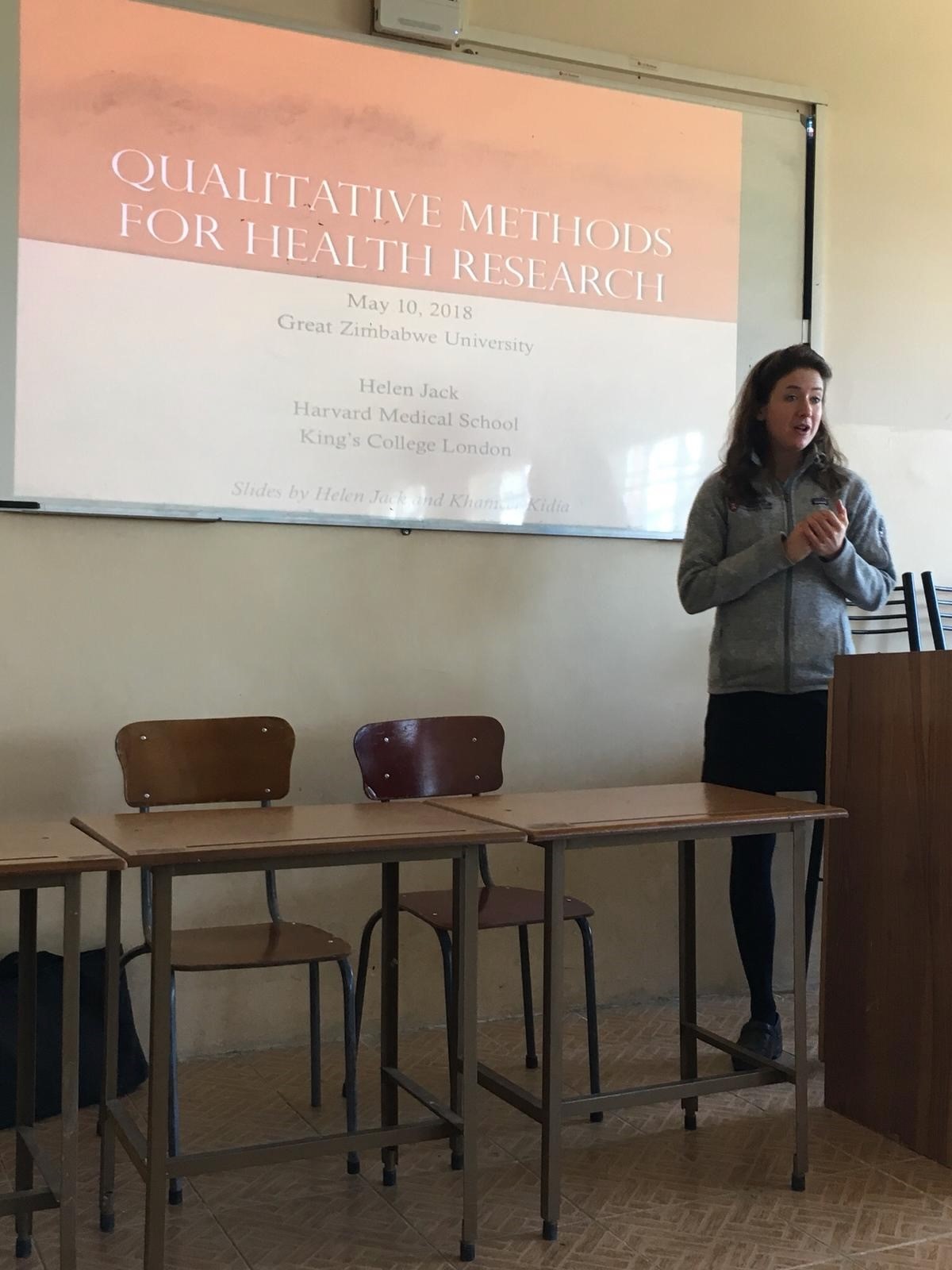


Faculty Spotlight: Helen Jack
Background
Dr. Jack grew up in New Hampshire and attended undergrad at Yale University. As a high school student, she first considered becoming a doctor, seeing medicine as a way to combine her human rights activism with Amnesty International and her enjoyment of her high school science classes. During her first semester of her freshman year, she emailed a public health professor who did international health work, Dr. Kaveh Khoshnood, for advice.
“The biggest human rights abuse he had heard of lately, he told me, was the lack of methadone or buprenorphine for people who are incarcerated in most US jails or prisons. People in jail may be forced into opioid withdrawal. They are not given treatment for their disease and may have to appear in court while in withdrawal.”
Struck by this, she wrote an article about it for a student publication about methadone in jails and prisons, started shadowing weekly at a local methadone clinic, and began doing global health research. Her desire to be a primary care physician and a researcher solidified.
After graduating from Yale, Jack received a second BA from Oxford University and her medical degree from Harvard Medical School. She then came to the University of Washington for residency in the primary care track of the Internal Medicine Residency program, which she completed in 2021. She is now a physician-scientist in the Division of General Internal Medicine, focusing on the integration of mental health and substance use treatment in primary care settings both domestically and in low and middle-income countries.
Clinical care
Jack has chosen to do her clinical work with the Washington Department of Corrections, providing primary care at a prison in a tiny town called Connell in rural eastern Washington.
“Now, in fact,” she says, “I am involved in prescribing buprenorphine within the state prison system and recently submitted a grant on opioid use disorder treatment in prisons, addressing the very problem that drove me to medicine.”
While she says her patient care and clinical quality improvement work feel immediately gratifying and impactful, she feels it is crucial to also focus research on the bigger picture issues and questions that impede their care. “I wouldn’t want to do one of these things without doing the other,” she said.
Global health work
Mental health and substance use among people who are incarcerated
Much of Jack’s research focuses on global mental health and substance use, particularly for incarcerated individuals, topics that are under-researched and often overlooked.
“While we talk a lot about the problem of mental health and substance use among people who are incarcerated in the US,” she said, “this issue is often ignored in global mental health.”
She learned this first-hand during one of her first studies in Zimbabwe. During key-stakeholder interviews, many reported that much of mental health care is delivered within the prison system. However, their meta-analysis showed that while there was a 38% prevalence of substance use and a 33% prevalence of psychotic disorders, only three studies examined interventions to address these issues.
She is currently leading a study to determine research priorities related to mental health and substance use among people who are incarcerated in sub-Saharan Africa. Jack will be working in partnership with Nigerian forensic psychiatrist, Dr. Adegboyega Ogunwale and an Advisory Board of people from around sub-Saharan Africa who are working in this field or have lived experience.
The study will recruit experts from around the region to participate in a Delphi panel, a structured, asynchronous consensus-building process. The Delphi is aiming to identify what the team is calling “priority challenges” for addressing mental health and substance use among people who are incarcerated in sub-Saharan Africa.
“This project has been particularly exciting for me because it brings attention to a population that is too often invisible and forgotten, and it combines my clinical work in a state prison with my research in global mental health.”
Jack hopes that the Delphi can bring attention to this issue and help direct research and other resources away from simply measuring the prevalence of disease and towards addressing it and some of the broader injustices in this system that contribute to poor behavioral health outcomes. Once the work is complete, they plan to disseminate the findings in both the academic literature and to lay and policy audiences.
Depression guidelines in primary care

methods in Zimbabwe
Jack submitted a K23, an NIH early career development award, during her last year of residency to spend five years studying the implementation of the WHO’s depression treatment guidelines in primary care in Zimbabwe. Jack had been doing mental health research and research capacity building in Zimbabwe since 2013, throughout her medical training.
The project was funded in October 2022, and for the past several months, she has been working through the slow process of obtaining the appropriate IRB approvals and setting up data collection systems in Zimbabwe.
She has partnered with an early career mental health researcher from Zimbabwe, Ms. Malinda Kaiyo-Utete, and they are looking forward to starting data collection in October of this year.
Initially, they will evaluate how successful government efforts to implement the guidelines have been: ‘are nurses appropriately identifying depression and referring to treatment in primary care?’
After that, they will work with nurses and their supervisors to design a clinic-level strategy to facilitate screening, initial management, and referral to lay health worker delivered therapy; and then evaluate that strategy in a pilot cluster randomized controlled trial.
“Identification and management of depression in primary care is hard worldwide! As primary care providers, we often fail to pick up depression or treat it appropriately,” she said. “We hope that this strategy may support guideline-based depression care in both Zimbabwe and other settings where these global guidelines are used.”
HEAAR curriculum
Jack is excited to be a part of the Internal Medicine residency’s Health Equity, Advocacy, and Anti-Racism (HEAAR) curriculum for which she is helping build out resident training in advocacy along with Dr. Anders Chen.
Their goal for the advocacy training is for residents to see advocacy as one possible part of their role as physicians. The curriculum aims to help residents think about advocacy broadly, encompassing not just legislative advocacy for state or federal policy change, but advocacy for changes within a clinic or health system, advocacy for the needs of an individual patient, or written advocacy, like a commentary piece or op-ed.
“We often practice medicine within structures, systems, and societies that are unjust and do not serve our patients,” she said, “and we want residents to feel empowered to play a role in changing that.”
Over the past two years, the two have built out the advocacy curriculum so that all residents have some exposure to advocacy in the PGY-1 and PGY-3 years, with additional training for residents in the primary care track and Health Equity Pathway. She also teaches a brief workshop every summer to residents in the Physician Scientist Pathway about the intersections between research and advocacy.
Interests and hobbies

Jack loves backpacking and one of her favorite things about living in Seattle is the access to mountains – “I’ve loved hiking and backpacking in the Cascades and Olympics.”
“Right after college, I hiked the 211-mile John Muir Trail in the Sierras in central California, doing the first week with my dad and the last eleven days by myself,” she said. “The Sierras remain among my favorite places in the world, and I try to get there every summer for some backpacking and have been increasingly exploring more off-trail scrambling.“
Since moving here for residency, she’s also grown to love early morning open water swimming in Lake Washington – “but only in the summer! I still don’t understand the people who swim outside year-round,” she jokes.